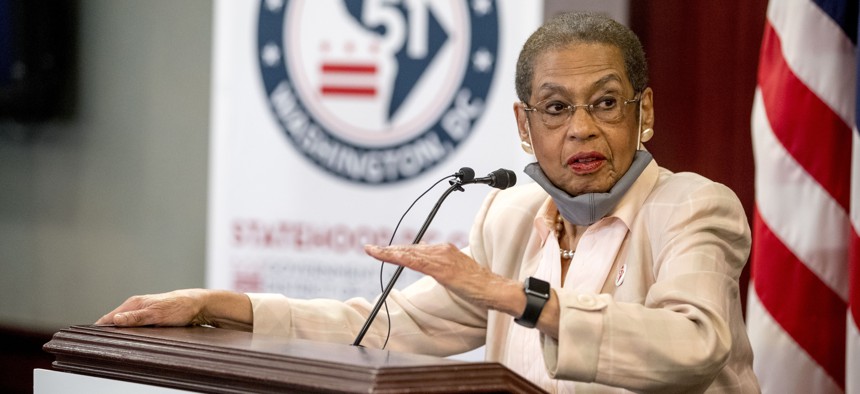U.S. House Approves D.C. Statehood for First Time in History

Delegate Eleanor Holmes Norton, D-D.C., speaks at a news conference on District of Columbia statehood on Capitol Hill, Tuesday, June 16, 2020, in Washington. AP Photo/Andrew Harnik
The historic vote in the House of Representatives will be met with opposition in the Senate.
The House of Representatives approved legislation Friday that would make Washington, D.C. the 51st state, marking the first time a congressional chamber has passed such legislation.
The bill will not become law, as both the Republican-led Senate and President Trump oppose D.C. statehood. But House Democrats championed the measure, which passed 232-180, arguing Congress has a moral obligation to provide full voting rights to the more than 700,000 residents who live in the District and pay federal taxes.
“The United States is the only democratic country that denies both voting rights in the national legislature and local autonomy to the residents of the nation’s capital,” said Eleanor Holmes Norton, the District’s non-voting representative to Congress, on the House floor.
The bill, H.R. 51, would reduce the size of the federal District and create a new state out of the rest of the present-day city.
Residents of Washington, D.C. currently pay more in federal income taxes than 22 states, and its population outnumbers those living in either Wyoming or Vermont. But those people lack a voting member in Congress. They elect a non-voting delegate to the House, a position Norton has held since 1990, as well as a “shadow” delegation of one representative and two senators, who are relatively powerless on Capitol Hill.
Opposition to D.C. statehood largely comes down to politics. The vast majority of registered voters in Washington, D.C. are Democrats, and statehood would almost surely add two Democratic senators and one Democratic representative in Congress.
“What this is really all about is an attempt to get two more Democratic senators,” said Rep. Jody Hice, a Georgia Republican, on the House floor Friday.
Republicans flatly rejected the idea that the District should become a state and ticked off a litany of objections and alternatives before Friday’s vote.
Rep. Louie Gohmert, of Texas, suggested that D.C. residents could be exempt from paying federal taxes like federal territories. Rep. Andrew Harris, of Maryland, called the push for statehood a “purely political ploy” and suggested the District should retrocede back into Maryland.
Shortly after the historic vote Friday, D.C. Mayor Muriel Bowser posted a video cheering the action and promising to keep the pressure on both Democrats and Republicans.
“We are not letting Mitch McConnell off the hook,” she said of the Senate majority leader.
When President Barack Obama was in office and Democrats held control of both the Senate and the House in 2009 and 2010, no statehood bills advanced. But Democrats have seized on D.C. statehood as a rallying cry in an election year.
“For more than two centuries, the residents of Washington, D.C. have been denied their full right to fully participate in our democracy,” said House Speaker Nancy Pelosi on the House floor Friday. “Instead, they have been dealt the injustice of paying taxes, serving in the military and contributing to the economic power of our nation while being denied the full enfranchisement that is their right.”
The last time the House voted on a D.C. statehood bill was in 1993, when the legislation was defeated 277-153.
Local Washington, D.C. lawmakers have fended off a litany of arguments against statehood since then, from attacks on city leaders’ governing acumen to questions about the constitutionality of altering the federal district.
In addition to disenfranchising D.C. voters, the District’s unique status constrains its independence in other ways.
The Home Rule Act of 1973 set up the city’s current governmental structure, but gives Congress authority to have final say on all D.C. legislation and allows it authority over the District’s finances. In the past, lawmakers on the Hill banned Washington, D.C. from using city funds to pay for needle exchange programs and prevented local lawmakers from establishing a taxed and regulated system for recreational cannabis after residents voted overwhelmingly to legalize marijuana.
Local courts are run by the federal government and the U.S. Attorney for the District of Columbia, who is tasked with prosecuting most local crimes, is appointed by the president and confirmed by the Senate.
The latest example of the District’s lack of autonomy came into focus this month amid the protests over police brutality and the death of George Floyd, during which President Trump ordered National Guard troops from other states deployed in Washington, D.C. over Bowser’s protests.
The president has the authority to take command of the city’s police department, and Trump had threatened to do so if protests and rioting got out of control.
Bowser has indicated she would challenge the legality of any attempt by the federal government to take over city police forces.
“I was born without representation, but I swear—I will not die without representation,” she said after the vote.
Andrea Noble is a staff correspondent with Route Fifty.
NEXT STORY: Prisons and Jails Remain Outbreak Vectors for Coronavirus





